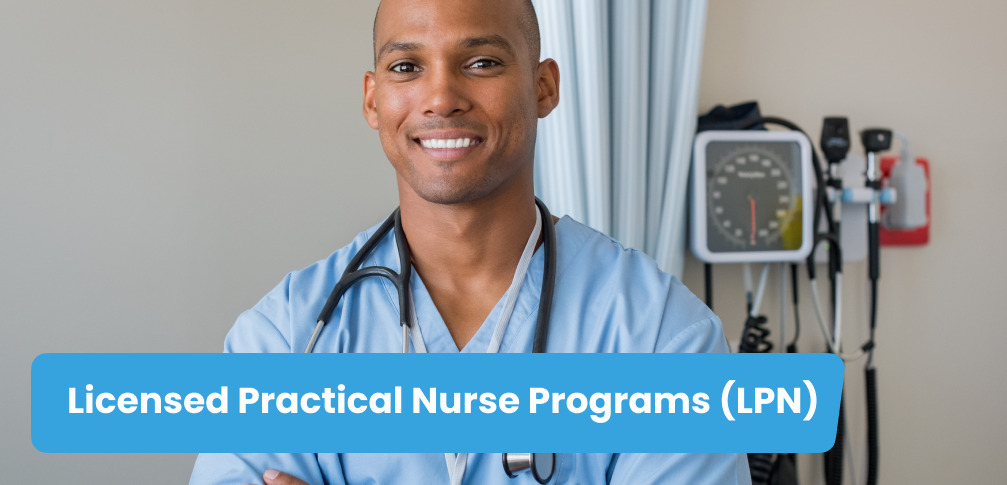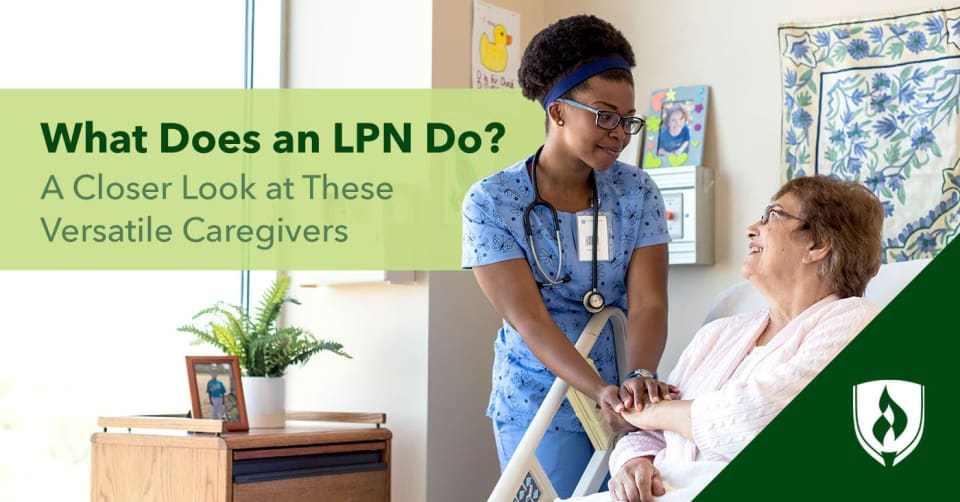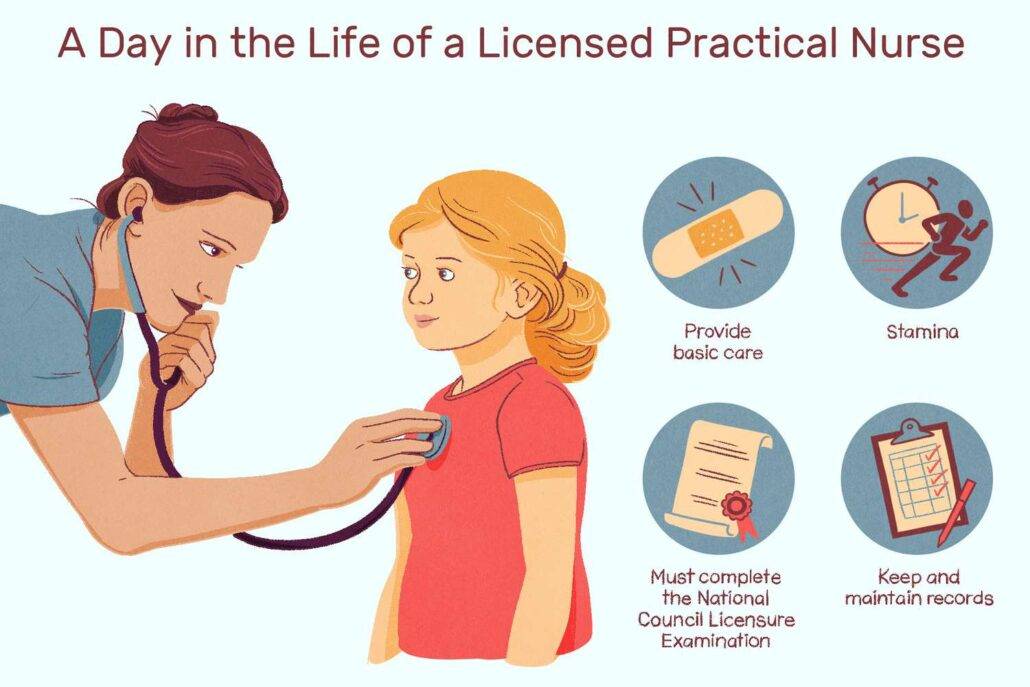Thinking about becoming a nurse? This complete guide gives you all the info you need about the LPN program, from what you’ll learn to what your job prospects could be. Find out if this is the right path for you!
What is an LPN Program?

An LPN, or Licensed Practical Nurse, is an important member of the healthcare team. They work closely with doctors and registered nurses to provide basic care to patients. This includes tasks like giving medicine, taking vital signs, and making sure patients are comfortable. LPNs are like a bridge between the patient and the healthcare providers. They’re there to help with everyday needs and make sure patients are well looked after.
To become an LPN, you go through special training that covers a wide range of medical topics. This includes learning about how the body works, understanding different illnesses, and knowing how to use medical tools. LPNs are known for being compassionate and caring, which makes them great at providing emotional support to patients and their families. They’re like the friendly face you can count on when you’re in a hospital or healthcare facility.
How Long Does an LPN Program Take?
The LPN program typically encompasses a duration of study spanning from 12 to 18 months, contingent upon the specific institution and the intricacies of the curriculum. This duration is meticulously structured to strike a balance between comprehensive theoretical instruction and hands-on clinical experience. Students embark on a journey that encompasses an array of subjects, ranging from anatomy and physiology to pharmacology and practical nursing skills. The curriculum is strategically designed to provide a well-rounded education, ensuring that graduates emerge as adept and compassionate healthcare professionals.
Curriculum for LPN Program
The LPN program curriculum encompasses a diverse array of subjects, blending theoretical knowledge with hands-on practical experience to equip students with the necessary skills for competent nursing practice. The coursework is meticulously designed to cover a broad spectrum of healthcare fundamentals.
Core subjects delve into anatomy and physiology, exploring the intricacies of the human body’s structure and function. This knowledge forms the bedrock upon which subsequent learning is built. Pharmacology, a pivotal component, imparts understanding about medications, their effects, and safe administration protocols.
Courses in medical-surgical nursing deepen the understanding of caring for patients across a range of conditions, including surgical procedures and associated pre- and post-operative care. Maternal and child health is another significant facet, equipping students with expertise in pregnancy, childbirth, and pediatric care.
Furthermore, mental health nursing addresses psychological well-being, teaching approaches to support individuals experiencing mental health challenges. Practical training, conducted in clinical settings, allows students to apply theory in real-world scenarios. This hands-on experience is essential for developing confidence, critical thinking, and problem-solving abilities.
Admission Requirements for LPN Program
The prerequisites for gaining admission into LPN programs are subject to variation, contingent upon the institution. Generally, they entail possession of a high school diploma or an equivalent GED. Additionally, specific programs may stipulate mandatory preparatory coursework in the realms of biology, chemistry, or mathematics.
What are the Prerequisites for LPN Program?
To embark on the journey towards becoming a Licensed Practical Nurse (LPN), there are certain prerequisites that aspiring students typically need to meet. These prerequisites serve as a foundation to ensure that students have the necessary knowledge and skills to succeed in the program. Commonly, LPN programs require candidates to possess a high school diploma or an equivalent GED (General Education Development) certificate. This ensures that students have attained a basic level of education, which is crucial for comprehending the complex medical concepts they will encounter in the program.
Additionally, some LPN programs may call for specific preparatory coursework in subjects like biology and chemistry. These basic science courses provide essential knowledge about the human body’s functioning and the fundamental principles of healthcare. This prerequisite helps students grasp the core concepts more effectively when they progress to advanced topics during their LPN studies. It ensures that students have a strong foundation in the sciences, which is vital for their success in the program and their future careers in nursing. By fulfilling these prerequisites, students are better equipped to excel in their LPN program and ultimately become skilled and compassionate healthcare professionals.
How Much Does an LPN Program Degree Cost?
The fiscal investment for enrollment in an LPN program spans a range from $5,000 to $15,000. The ultimate expense is contingent on factors such as geographical location, the hosting institution, and the overall duration of the program. Financial support avenues, encompassing aid, scholarships, and grants, may be accessible to eligible candidates.
Is an LPN Program Worth It?

LPNs play a vital role in taking care of patients, and the need for their services is expected to keep growing. Since the program doesn’t take too long and offers a fulfilling and important career, choosing to become an LPN is a smart and wise choice for your future.
Why Is LPN Program Accreditation Important?
Accreditation of an LPN program is a crucial factor in ensuring the quality and credibility of the education and training provided. Here’s why it holds such significance:
1. Quality Assurance:
- Accreditation ensures that the LPN program meets specific standards set by accrediting bodies. This guarantees that students receive education of a certain quality, preparing them adequately for their roles as practical nurses.
- It ensures that the curriculum is well-structured, comprehensive, and up-to-date with the latest advancements in healthcare. This means that graduates are equipped with the most relevant and effective skills and knowledge.
- Accredited programs often employ experienced and qualified faculty members, enhancing the overall learning experience for students.
2. Transferability of Credits:
- Students who wish to further their education or transfer to another institution for any reason will find it much easier if they’ve graduated from an accredited program. Accreditation allows for the smooth transfer of earned credits, ensuring that the time and effort invested in education are recognized and not wasted.
- It provides a safety net for students, as they have the assurance that the credits they’ve earned are valid and accepted by other institutions.
3. Eligibility for Licensing Exams:
- Many licensing boards require candidates to have completed an accredited program. This means that without accreditation, graduates may not be eligible to take the licensing exams required to become a licensed practical nurse.
- Being unable to take these exams could significantly hinder a graduate’s ability to practice as an LPN, making program accreditation crucial for career progression.
4. Reputation and Credibility:
- Employers in the healthcare industry often prefer to hire graduates from accredited programs. Accreditation serves as a mark of quality, and employers trust that graduates from accredited programs have received a well-rounded education.
- It also reflects positively on the graduate’s resume, instilling confidence in potential employers about their competence and readiness to work in a healthcare setting.
What is the Employment Outlook for LPN?

The outlook for employment in the field of Licensed Practical Nursing (LPN) is quite promising. According to data from the Bureau of Labor Statistics, the demand for LPNs is projected to grow by 9% from 2020 to 2030. This growth rate is faster than the average for all occupations. This means that there will be an increasing need for skilled LPNs in healthcare settings over the next decade.
This positive employment outlook can be attributed to several factors. Firstly, the aging population is likely to require more healthcare services, leading to a greater demand for healthcare professionals, including LPNs. Additionally, advances in medical technology and treatment options are increasing the lifespan of patients, further driving the need for skilled and compassionate LPNs. As a result, individuals pursuing a career as an LPN can have confidence in their job prospects and can expect to find opportunities in various healthcare settings, such as hospitals, nursing homes, clinics, and home health care agencies.
What Makes This Major Unique?
The LPN program distinguishes itself by offering a swift entry point into the nursing field, as compared to the conventional RN-to-BSN trajectory. Graduates emerge with a robust foundation in practical nursing skills, positioning them as invaluable contributors to healthcare teams.
Is it Best to Take the LPN Route for Nursing (then take the RN-to-BSN) or BSN?
Deciding between the LPN route and a Bachelor of Science in Nursing (BSN) depends on your career goals and individual circumstances. The LPN route offers a quicker entry into the nursing field, typically taking about 12 to 18 months to complete. This means you can start working sooner as a licensed practical nurse, providing basic care to patients under the supervision of registered nurses. It’s a great option if you’re eager to get into the workforce faster and gain practical experience right away.
On the other hand, pursuing a BSN involves a longer educational journey, typically spanning four years. However, it opens up a broader range of career opportunities in nursing. With a BSN, you can take on more advanced roles and have the potential for higher earning potential in the long run. It also lays a solid foundation for further specialization or pursuing advanced degrees in nursing, such as a Master of Science in Nursing (MSN) or Doctor of Nursing Practice (DNP). If you’re looking for a more comprehensive and versatile nursing education, a BSN might be the right path for you. Ultimately, it’s about aligning your educational choices with your long-term career aspirations in the nursing field.
Conclusion:
Choosing to enroll in an LPN program is a commendable step toward a rewarding healthcare career. With a relatively short time commitment and promising job prospects, becoming an LPN is a practical choice for those passionate about nursing. It’s crucial to carefully choose an accredited program and think about your long-term career goals. Don’t miss the chance to invest in your professional future – consider an LPN program today!
Frequently Asked Questions
- What does LPN 1 mean?
“LPN 1” typically refers to a Licensed Practical Nurse in their first level or year of practice. It signifies a newly licensed nurse who has recently completed their LPN program and is beginning their career in healthcare.
- What is the difference between an LPN and an RN?
- Education: An LPN (Licensed Practical Nurse) typically completes a one to two-year program, while an RN (Registered Nurse) usually holds an associate’s or bachelor’s degree, which takes around two to four years to complete.
- Scope of Practice: LPNs provide basic nursing care under the supervision of RNs or physicians. They administer medication, take vital signs, and assist with daily living activities. RNs have a broader scope and can perform more complex tasks, including medication administration, treatment planning, and even some diagnosis.
- Responsibilities: RNs often take on more leadership roles, coordinating care plans and making critical decisions. They can work in specialized areas like intensive care, surgery, or pediatrics, while LPNs generally work in settings like nursing homes, clinics, or rehabilitation centers.
- What can an LPN do?
LPNs play a crucial role in patient care. They can:
a. Administer medication (oral, injections, etc.).
b. Take vital signs (pulse, blood pressure, temperature, etc.).
c. Provide basic wound care and dressing changes.
d. Assist with activities of daily living (bathing, feeding, etc.).
e. Monitor patients’ condition and report any changes to the healthcare team.
4. What is the best school to become an LPN?
The best school for becoming an LPN depends on various factors including location, your personal preferences, and financial considerations. It’s important to look for schools that are accredited, have a strong curriculum, experienced faculty, and good clinical training opportunities. Researching and visiting schools, reading reviews, and talking to current students or graduates can help you make an informed decision. Additionally, considering factors like cost, location, and available resources is also crucial in choosing the best school for your LPN education.
A Page will cost you $12, however, this varies with your deadline.
We have a team of expert nursing writers ready to help with your nursing assignments. They will save you time, and improve your grades.
Whatever your goals are, expect plagiarism-free works, on-time delivery, and 24/7 support from us.
Here is your 15% off to get started.
Simply:
- Place your order (Place Order)
- Click on Enter Promo Code after adding your instructions
- Insert your code – Get20
All the Best,
Cathy, CS


